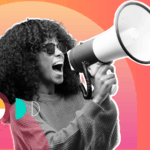By Britt Fero, Founder and Principal, PB&
Both individually and collectively, in less than 24 months, we’ve experienced the wide-ranging impacts of COVID – from physical and mental health to inequities in our health system. We’ve been embroiled in political elections and factions, felt the outrage around the murder of George Floyd and Anti-Asian hate crimes, and were bystanders to a siege of the US Capitol. In short, it’s been 24 months defined by “the worst of us” or certainly some unattractive parts of humanity.
In light of that, perhaps it’s a blessing that the Tokyo Olympics were pushed to 2021. More than ever, as a national and even global community we need what the Olympic Movement provides – an antidote to the cultural tenor of the past two years; a push to exhibit “the best of us.”
Unity, not divide. “It’s so nice seeing all the countries coming together” was the lead to a conversation I recently overheard. As countries and athletes march in the Opening Ceremonies, viewers and participants alike can’t help but feel the pride and camaraderie among everyone on that field. The energy is palpable and the shared emotions of earning a spot on the world stage, representing your country and achieving a dream can be felt far and wide. The Olympics offers a moment where individuals and collectives join together to cheer for each other, push each other forward and celebrate the power of the human spirit – without restraint. Kids can learn about other countries. Adults can see beyond politics. Borders disappear and for two weeks, we just embrace being human.
Emerging Stronger. The Olympics has often been a showcase for ‘comebacks’ – Michael Phelps, Greg Louganis, Kerri Strug and the USA Hockey Team are notable. But there are also stories like that of Derek Redmond who tore his hamstring and still finished his race. Or Wilma Rudolph who overcame polio to compete at the Olympics. This event, this Movement, is a testament to the resilience and sometimes redemption. Perhaps it’s why many eagerly wondered if Ryan Lochte would swim this year and correct his personal history. No matter what ‘bad’ happens, the Olympics has shown that we can not only persevere but often – emerge stronger. So after several months of ‘bad’, perhaps the Olympics can serve as an example of global resilience, that life can feel ‘normal’ again – resulting in an incalculable burst of global confidence.
Changing Culture (and Sport) for the Better. “How do they do that?” “I could never do that!” These are quintessential soundbites of viewers (and even announcers). As the best of the best compete on the world stage, accomplishment and achievement in sport are often the defining characteristics of the Olympics. But beyond the perfect 10s or record-shattering times, this is an event where even greater cultural accomplishments also have their moments: from the introduction of the IOC Refugee Olympic Team to having women compete in all sports on the Olympic program for the first time in 2012, to being a springboard for racism and civil rights conversations. So while this year’s water cooler conversation is fueled by Alyson Felix as she sets out to prove that all women can be both a mom and a record-breaker; the Games have perpetually pushed not just sport – but the world forward.
The Olympics, one of the most anticipated sporting events of the year, can’t solve all of the problems that surround us, but for two weeks we can relish in the best of humanity. And it’s my hope that perhaps it also kicks off the next chapter in culture. A chapter that calls for us to see through differences, find resolve, create renewed focus, and rise to new heights – both individually and collectively.
Here’s to the next chapter of culture being defined by “the best of us.”







